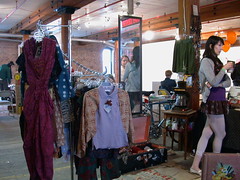 Image by eob via Flickr
Image by eob via Flickr
FairTrade Fashion - The Ultimate Guide by Nicholas Watson
The days when FairTrade fashion meant tie-dyed pantaloons and ill-fitting ethnic smocks are long gone. Top designers are now working with new ethical fashion labels to create clothes and accessories that are desirable, not just because they're associated with a good cause, but because they're stylish and beautiful.
So what makes FairTrade fashion fair? Here is a quick summary of the 5 things to look out for:
1. There are a number of FairTrade certification bodies that you should look out for when you're browsing for FairTrade products. A good one is the World FairTrade Organisation, while in the UK, the British Association for FairTrade Shops (BAFTS) is another standards organisation. These organisations help customers know that the products they're buying are genuinely ethical.
2. Where are the products made? And under what conditions? Do you really want to buy from companies that outsource their production to sweatshop manufacturers with poor conditions and low wages for their workers? FairTrade or ethical fashion companies will be happy to explain where and how their products are made. Remember: transparency and FairTrade go hand in hand.
3. What materials are being used? FairTrade and environmental sustainability are different concepts, though in practice FairTrade fashion companies will also engage in eco-friendly sourcing practices. So look out for organic cotton, recycled items and other 'green' materials.
4. FairTrade fashion isn't just confined to the margins of the fashion world. Many mainstream shops have FairTrade concessions, and there are now ethical and eco-friendly fashion labels showcased on the catwalk at all the major fashion shows.
5. Price. Ethical fashion is no longer the preserve of the wealthy, with increasingly affordable products available as the movement becomes more mainstream. However, fast fashion goods like T-Shirts for £2.99 are not a realistic price. Someone somewhere will be paying the true cost of that T-Shirt - most likely in a miserable wage and poor conditions. According to the NGO ActionAid, if the retail price of a £6 dress was increased by just 10p it would be enough to double the wages of the factory worker in Sri Lanka who produced it. Ethical fashion can make a real difference.
You might think the global economic downturn could impact on customers' appetites for FairTrade fashion. But according to the Cooperative Bank's Ethical Consumer report, sales of FairTrade and organic clothing grew by 70% to £52m in 2007, and this year is scheduled to see still further growth.
And consider this: in 2007 a survey by TNS Global found that 60% of under-25s said they bought what they wanted, regardless of where or how it had been made. This year that figure had dropped to 36%, suggesting that child labour and sweatshop scandals have made their mark.
The future's great for ethical consumers and suppliers.
Nicholas Watson is a commentator on FairTrade fashion issues and a regular contributor to international media on FairTrade. He is also founder of the online FairTrade outlet Jungle Berry.
![Reblog this post [with Zemanta]](http://img.zemanta.com/reblog_e.png?x-id=147c473f-dd2a-4e1f-9f3d-0e121f85fe05)
The time for Fair Trade to move to center-stage is with us. Turn the world into a Fair Trade fashion catwalk on World Fair Trade Day 09 MAY 09.
ReplyDeleteThe Day has been named BIG BANG!! and it is the day that the Fair Trade world unites to beat poverty beat climate change beat economic crisis. Witness the birth of the sustainable economy, join us at http://www.worldfairtradeday09.org/
Well done Dr Muller! Im really glad I found your blog. I've been ruminating over the same ideas for the past year. I too think we are on the cusp of a market revolution - whereby technology enabled transparency is coupled with the realisation that we can make a massive difference simply by making better choices when we purchase. People are starting to do business with businesses that do the right thing. This economic downturn is the catalyst in my opinion.
ReplyDeleteI work for Shared Interest, the world's only 100% fair trade lender. Demand for our lending has never been higher. This is due to two factors - the first is the global credit crunch; the second is that there are simply more fair trade buyers and producers.
If any of your readers in the UK would like to learn more about investing in fair trade, please visit our website. We'd love to exchange links as well. Please drop me a line if this is of interest. patrick.dodd(at)shared-interest.com